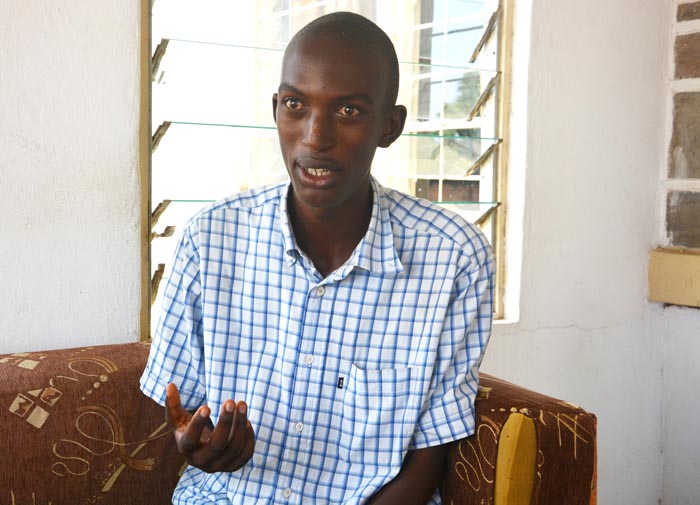Stuttering can be an embarrassing and difficult impediment to overcome. Since long ago, many famous people including philosophers and scholars have struggled against stuttering, but not completely. Today, Burundian stutterers have created a framework to help each other.-By Diane Uwimana

Pacifique Mahoro, the Chairman of Burundi Association of Fighting Against Stuttering: stuttering causes are genetic, traumatic and linguistic troubles.©Iwacu
The causes of stuttering are due to different things. Some stutterers, also called stammerers, have achieved to overcome their problems whereas others have been stuttering up to their adulthood. Jimmy aged 28, is one of those who stuttered in their childhood. “I began to stutter when I was in primary school. This abnormality was caused by trauma. My parents ordered me to do many things at the same time. Unfortunately, I didn’t find any words to express myself and I finally stuttered because I was nervous”, he says. When he was in the second year in primary school he was left-handed. Suddenly, his teacher obliged him to write with his right hand instead of the left one. “Step by step, I have become familiar with my right hand and this has changed my linguistic trouble positively. Today, I speak without any obstacle”, thanks Jimmy. For him, stutterers should overcome the situation if they readapt their situations. “When I was in secondary school, I took part in different associations and groups. There, it was a must to speak loudly in front of many people. It allowed me not to be shy and fight against nervousness”, recalls Jimmy. About 100 stutterers have been identified in the whole country among them four girls. Pacifique Mahoro, the Chairman of Burundi Association of Fighting Against Stuttering (“Association pour Vaincre le Bégaiement”), indicates that stuttering causes are genetic, traumatic and linguistic troubles. He mentions that some of them have succeeded to overcome it thanks to the help of some psychologists and psycholinguists.
A framework by and for stutterers
The greatest pleasure for a person, who stutters, is to take part in groups and share experience with other stutterers. Pacifique Mahoro notes that there is a new framework set up by and for stutterers which will allow them to meet each other, once a month. “We will be accompanied by psychologists and former stutterers in order to bridge the gaps existing between us”, hardly pronounces Mahoro. Moreover, everyone is concerned. Parents have a big role to play in order to break down the obstacles. So, they may avoid to teach children puzzled tricks, show them that they’re worried and tell them that they stutter, and not to compete or feel that they are different. For Mahoro, positive support and good examples are welcome to motivate stutterers. Listen to them and give them cool time so that they can feel confident. Then, it is also important to encourage them to take part in different activities; they must be at ease and honest, too.
Pr Hilaire Ntahomvukiye, Psycholinguist and Lecturer at the University of Burundi notes that stuttering is due to many factors: “heredity, trauma, linguistic troubles, and lack of self confidence, psychological and environmental issues.” In addition, he mentions that parents may also contribute to stuttering increase by recommending excessive requirements and addressing harsh verbal words. As it is difficult to prevent stammering and establish a plan to fight against it, he states that overcoming the situation is individual. “The first important thing to do is to decipher the causes and readjust them to the situation”, states Professor.
——————————————————————————————————————————————————————————————
According to the International Association of Stuttering, stutterers have the rights and responsibilities like other people:
A person who stutters has the right to…
1. stutter and do it as long as he/she can ;
2. communicate regardless of his/her degree of stuttering;
3. be treated with dignity and respect by individuals, groups, governments, organizations, business agencies or by journalists and artists;
4. avail accurate information on stuttering to the public ;
5. protect stutterers regardless of their degree of stuttering;
6. provide full information about the programs of therapy, including likelihood success, failure, relapse or other obstacles &
7. give them appropriate treatment according to their own needs.
A person who stutters has the responsibility to…
1. understand that listeners or conversation partners may be uninformed about stuttering and its ramifications or they may have different views on stuttering;
2. inform listeners or conversation partners that he/she needs more time to communicate;
3. participate in therapy of his/her own choice;
4. do what he/she can to overcome the life obstacles that take place because of stuttering, including the development of a realistic assessment of his/her strengths and weaknesses and perhaps a sense of humour about himself/herself;
5. consider and deal with others who have problems, disability equity before the law and in dignity and respect regardless of the nature of their conditions &
6. Be aware that he or she has the power to promote awareness of stuttering and its ramifications.



















 IWACU Open Data
IWACU Open Data

